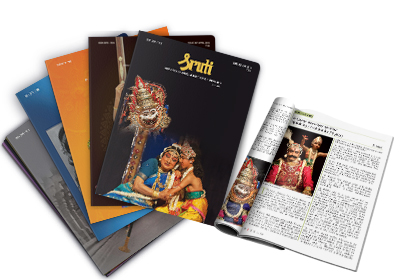TALKING THEATRE - Can a playwright be a sage? by Indira Parthasarathy
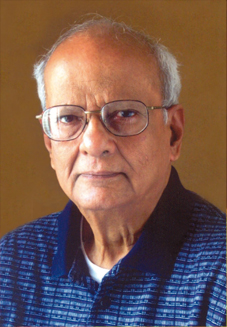
It may not be inappropriate for me to strike an autobiographical note, before I start this column
on theatre.
I joined Pondicherry University as the Director of the Drama School on an invitation from the dynamic and innovative first vice-chancellor of the university, the late K.Venkatasubrahmanyan in 1988. The Registrar and some members of the teaching staff expressed their surprise that I accepted the post despite my three decades of academic experience as a teacher of a real subject in a reputed university! Their objection to ‘drama’ as one of the disciplines in the university curriculum was that it was not ‘honourable’.
SPECIAL FEATURE - An obsession with music by V. Ramnarayan
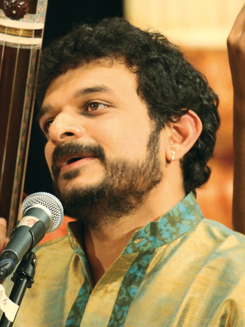
Excerpts from a freewheeling conversation T.M. KRISHNA had with the author.
Can you describe your practice methods?
In my early days I practised a lot, thanks to my guru Seetarama Sarma Sir. I can’t say that I was very disciplined, getting up early and doing sadhakam and all that, but I used to work at it. The period I slogged a lot was late school and early college – 1992 to 96, 10 hours a day.
I used to pick up a raga and just sing, sing, sing, sing, sing! Alapana, tanam, endlessly. I used to jam with Sriram Gangadharan a close friend. If we heard a Natakurinji in a concert, we came home and started singing the raga. It used to go on into the night. My practice has always been late at night.
I have this theory that we should push our mental capacity to the extreme during practice. A lot of nonsense may be there inside your head. When you practise Natakurinji for six hours for instance, other raga-s could be there inside you. Every musician has to develop a sieve in the thought process that will help to bring out the juice of what your mind is thinking and deliver it. Not necessarily in a concert, but when you sing naturally. You first need to throw everything out. You need to expel all extraneous matter. When you sing for four hours – you will reach a point when you are brain dead. But you just have to get to that point, where you are so saturated that you will go mad! After that, the mind starts clearing up what you sing. Among 50 ideas that come up in your mind, one idea may survive. Many people told me I was overdoing it, singing too much. Being the kind of person I was, I rebelled and continued to do exactly what I wanted to do. This was very good in one way. I learnt it all my way. If someone asked me to sing Todi, I just poured out everything I knew of Todi, all the sangati-s.
SPOTLIGHT - K.P. KUNHIRAMAN A lifetime spent in art by Barbara Framm
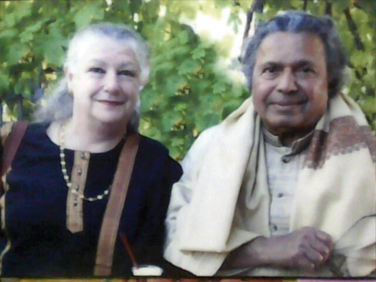
Ambu Panikkar, a renowned Kathakali artist from Malabar died moments before India’s independence in 1947. His memory lives on in the story of Kathakali. His son K.P. Kunhiraman who came to dance almost by chance, carries forward the legacy.
Ambu Panikkar had been a guru to Rukmini Devi Arundale. When he died, she invited Kunhiraman to Kalakshetra, where he spent the next thirty years as a student and an artist. He grew to be the quintessential Ravana, Viswamitra, Dasaratha, Guhan, and Vali in the famous Ramayana series, while fulfilling the major roles in all the Kathakali productions. He was noted for such roles as Bheeshma in Rukmini Kalyanam, Siva in Kumara Sambhavam, Nagarajan in Kannappar Kuravanji, and Kotwal in Shyama. Under the tutelage of his father’s colleague T.K. Chandu Panikkar, he helped in the early training of some of Kalakshetra’s great artists like V.P. Dhananjayan, C.K. Balagopalan, and A. Janardhanan.
After his marriage to Katherine Siebel, who studied both Bharatanatyam and Kathakali at Kalakshetra, and later graduated from Bharatakalanjali, he continued to perform with the Kalakshetra dance company after moving to the United States, where he makes his home in Berkeley, California.
NEWS & NOTES - R. Vedavalli 75: a life devoted to music by S. Janaki and Gayathri Sundaresan
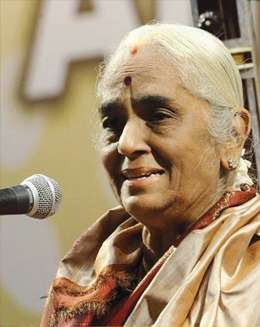
Sangita Kalanidhi R. Vedavalli turned 75 on 9th November 2010. Her dedicated band of disciples organised a ‘Panchasaptati Samaroha’ – a two-day event to celebrate this landmark in the life of their guru, on 13th and 14th November at Raga Sudha Hall in Chennai. The programme unfolded in four parts.
The first segment was a musical tribute titled Nivedanam comprising songs tuned by Vedavalli. Rendered in a dignified manner by her disciple V. Sumithra accompanied by Ashwin Anand (veena) and B. Sivaraman (mridanga), it set the tone for the celebrations.

